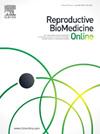RELATIONSHIP BETWEEN SERUM LH LEVELS ON THE HCG TRIGGER DAY AND LIVE BIRTH RATES FOLLOWING FRESH EMBRYO TRANSFER WITH GNRH ANTAGONIST PROTOCOLS
IF 3.7
2区 医学
Q1 OBSTETRICS & GYNECOLOGY
引用次数: 0
Abstract
Objective
Determining if serum LH levels on the hCG trigger day are correlated with live birth rates (LBR) following fresh embryo transfer with GnRH antagonist protocols.
Materials and Methods
A retrospective study was conducted at a university-based infertility clinic between January 2015 and December 2021. Participants were women aged 20-40 undergoing in-vitro fertilization (IVF) or intracytoplasmic sperm injection (ICSI) with fresh embryo transfer following a GnRH antagonist protocol. Women with normal basal FSH and TSH were included in the study. Exclusion criteria for the study were polycystic ovary syndrome (PCOS), poor responder status, recurrent abortions, and uterine abnormalities. Patients were categorized into two groups based on live birth (LB) and both groups were compared according to their age, antral follicle count (AFC), AMH, FSH, LH, progesterone, and estradiol levels, duration of stimulation, the dose of gonadotropins used, quality, and quantity of oocytes and embryos.
Results
Age, AFC, AMH, FSH, LH, and estradiol levels on D3, endometrial thickness on trigger day, total dose of gonadotropins used, duration of stimulation, starting day of antagonist administration, progesterone and estrogen levels on the hCG trigger day, follicles ≥14 mm and ≥17 mm on the trigger day, number of oocytes retrieved, number of MII oocytes, number of embryos and number of quality embryos were comparable in both groups. LH levels on the trigger day were the sole distinguishing characteristic between the two groups (Table 1).
Discussion and Conclusion
Our results revealed that elevated serum LH levels on the trigger day are linked to higher live births following fresh embryo transfer in GnRH antagonist cycles. It has been demonstrated in previous studies that LH plays a crucial role in various reproductive processes, including follicle development, ovulation, steroidogenesis, luteal function, and endometrial development (1,2). Our findings, which showed a significant discrepancy in LH levels on trigger day between the two groups suggest that elevated LH levels may contribute to higher implantation rates. Zhou et al. demonstrated in a large cohort that there is a positive association between serum LH levels on hCG trigger day and Iive birth rate after fresh embryo transfer in both normal ovarian responders and patients with PCOS (3). LH could serve as a predictive marker for determining whether to proceed with fresh embryo transfer in IVF cycles to optimize clinical outcomes.
求助全文
约1分钟内获得全文
求助全文
来源期刊

Reproductive biomedicine online
医学-妇产科学
CiteScore
7.20
自引率
7.50%
发文量
391
审稿时长
50 days
期刊介绍:
Reproductive BioMedicine Online covers the formation, growth and differentiation of the human embryo. It is intended to bring to public attention new research on biological and clinical research on human reproduction and the human embryo including relevant studies on animals. It is published by a group of scientists and clinicians working in these fields of study. Its audience comprises researchers, clinicians, practitioners, academics and patients.
Context:
The period of human embryonic growth covered is between the formation of the primordial germ cells in the fetus until mid-pregnancy. High quality research on lower animals is included if it helps to clarify the human situation. Studies progressing to birth and later are published if they have a direct bearing on events in the earlier stages of pregnancy.
 求助内容:
求助内容: 应助结果提醒方式:
应助结果提醒方式:


